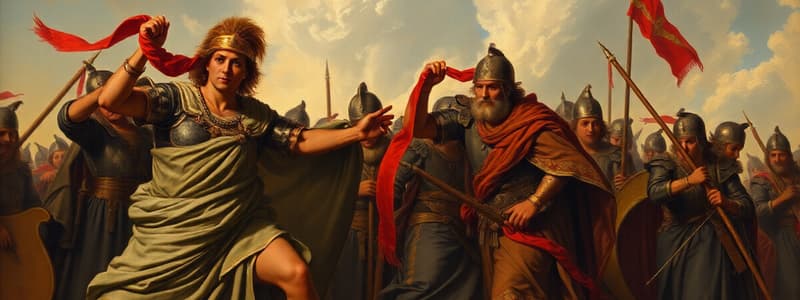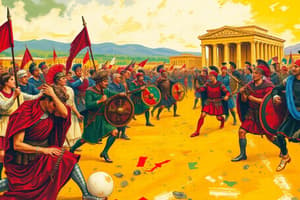Podcast
Questions and Answers
What do Antony and Octavius hope for regarding the enemy's approach?
What do Antony and Octavius hope for regarding the enemy's approach?
- That they will negotiate for peace
- That they will retreat to higher ground
- That they will wait for reinforcements
- That they will engage in battle at Philippi (correct)
What does Antony suggest about the enemy's courage?
What does Antony suggest about the enemy's courage?
- They are falsely displaying bravery (correct)
- They are eager for a quick victory
- They are well-prepared for combat
- They are not confident in their strategy
What does Brutus propose before engaging in battle?
What does Brutus propose before engaging in battle?
- They consider their past grievances
- They exchange words to understand each other (correct)
- They hold a discussion for peace
- They practice their military strategies
Why does Antony criticize Brutus's words?
Why does Antony criticize Brutus's words?
What does Cassius imply about Antony's words?
What does Cassius imply about Antony's words?
What is the general mood among the generals before the battle?
What is the general mood among the generals before the battle?
What does Octavius want to avoid before the battle begins?
What does Octavius want to avoid before the battle begins?
How does Antony compare the actions of the conspirators to animal behavior?
How does Antony compare the actions of the conspirators to animal behavior?
What does Brutus imply about dying by traitors' hands?
What does Brutus imply about dying by traitors' hands?
What does Cassius notice on his birthday that causes him concern?
What does Cassius notice on his birthday that causes him concern?
How does Brutus feel about the possibility of losing the battle?
How does Brutus feel about the possibility of losing the battle?
What do Cassius and Brutus discuss regarding their fate?
What do Cassius and Brutus discuss regarding their fate?
What does Brutus suggest about the power that governs their fates?
What does Brutus suggest about the power that governs their fates?
What is Cassius's initial reaction towards the omens he sees?
What is Cassius's initial reaction towards the omens he sees?
What is the mood during the conversation between Brutus and Cassius?
What is the mood during the conversation between Brutus and Cassius?
What does Brutus indicate about their potential meeting again?
What does Brutus indicate about their potential meeting again?
What does Cassius suggest about the nature of their current situation?
What does Cassius suggest about the nature of their current situation?
What literary device is prominent in the expressions of Cassius regarding omens?
What literary device is prominent in the expressions of Cassius regarding omens?
What strategy does Octavius believe the enemy is employing?
What strategy does Octavius believe the enemy is employing?
How does Antony react to the enemy's decision to come down from the hills?
How does Antony react to the enemy's decision to come down from the hills?
What is the significance of the phrase 'Words before blows' in the dialogue?
What is the significance of the phrase 'Words before blows' in the dialogue?
What does Antony accuse the conspirators of doing to Caesar during his assassination?
What does Antony accuse the conspirators of doing to Caesar during his assassination?
How does Cassius characterize Antony's speech?
How does Cassius characterize Antony's speech?
What does Octavius imply about waiting for a signal before engaging in battle?
What does Octavius imply about waiting for a signal before engaging in battle?
What does Brutus mean by saying, 'Good words are better than bad strokes'?
What does Brutus mean by saying, 'Good words are better than bad strokes'?
What is the main atmosphere among the generals just before the battle?
What is the main atmosphere among the generals just before the battle?
What notable event does Cassius mention in relation to his birthday?
What notable event does Cassius mention in relation to his birthday?
What does Cassius imply about the omens he and his soldiers have seen?
What does Cassius imply about the omens he and his soldiers have seen?
How does Brutus view the idea of facing death in battle?
How does Brutus view the idea of facing death in battle?
What does Brutus declare regarding the outcome of the battle?
What does Brutus declare regarding the outcome of the battle?
What does Cassius mean by 'blow wind, swell billow and swim bark'?
What does Cassius mean by 'blow wind, swell billow and swim bark'?
What philosophical view does Brutus follow regarding life and death?
What philosophical view does Brutus follow regarding life and death?
What do Cassius and Brutus agree upon as they prepare for battle?
What do Cassius and Brutus agree upon as they prepare for battle?
What unfortunate symbolism does Cassius see in the change from eagles to ravens?
What unfortunate symbolism does Cassius see in the change from eagles to ravens?
What is Brutus's attitude toward the idea of being captured if they lose?
What is Brutus's attitude toward the idea of being captured if they lose?
What does Brutus wish he could know regarding the day's events?
What does Brutus wish he could know regarding the day's events?
Flashcards are hidden until you start studying
Study Notes
Scene Setting
- The scene is set on the plains of Philippi.
- The opposing armies of Octavius and Antony vs. Brutus and Cassius are facing each other, preparing for battle.
Opposing Leaders
- Octavius speaks confidently about the impending battle, but Antony is more skeptical, assuming Brutus and Cassius are bluffing to appear brave.
- Antony is aware of Brutus and Cassius' inner motivations.
Messenger Arrives
- A messenger arrives to relay that the enemy is approaching in a formidable display.
- The enemy has raised their battle flag, signaling their intention to fight.
Battle Logistics
- Octavius and Antony discuss battle positions. Octavius proposes taking the right flank, while Antony favors the left flank.
- Antony questions Octavius' decision to switch positions, but Octavius insists on doing so.
Initial Parley
- Brutus and Cassius call for a parley before battle.
- Octavius and Antony agree to speak with them, but they won't retreat until the enemy attacks.
Verbal Confrontation
- Brutus and Cassius engage in verbal sparring with Octavius and Antony.
- Antony accuses Brutus of hypocrisy, claiming that his "good words" are contradicted by his actions, referencing his involvement in Caesar's assassination.
- Cassius defends Brutus, highlighting Antony's hypocrisy, claiming he is a master of flattery.
Escalating Rhetoric
- Octavius vows revenge for Caesar's assassination, declaring that the war will not end until Caesar's wounds are avenged.
- Brutus counters that Caesar cannot die by traitors' hands if he brings these traitors with him.
- Octavius reiterates his vow, adding that he will not die by Brutus' hand.
- Brutus responds that even if Octavius were the noblest man, his death at Brutus' hand would be honorable.
- Cassius insults Octavius, calling him a "schoolboy" and labeling Antony as a "masker and a reveller."
- Antony dismisses and mocks Cassius' insults.
Facing the Inevitable
- Octavius and Antony leave to prepare for battle, issuing a defiant challenge to the enemy.
- Cassius, feeling the weight of fate, welcomes the approaching storm, believing their fate is sealed regardless of the outcome.
Cassius Shares His Omens
- Cassius confides in Messala, revealing that he has changed his views on Epicurean philosophy.
- He relates a series of ominous events, including the departure of two eagles from their camp and the presence of ravens, crows, and kites instead, interpreting them as bad omens for the battle.
Final Farewell
- Cassius discusses the possibility of defeat with Brutus.
- He acknowledges that if they lose, it will be the last time they will speak.
- He asks Brutus what his plan would be in the event of defeat.
- Brutus, adhering to Stoic philosophy, refuses to submit to capture, acknowledging his own mortality while remaining defiant.
Epicurean vs Stoic
- Cassius' shift away from Epicureanism and embracing Stoicism is mirrored by Brutus' decision to fight to the death.
- Brutus embraces a fatalistic approach, refusing to cower in the face of death.
- The contrasting viewpoints illuminate the different philosophical schools of thought that influenced Roman leaders.
Final Moments
- Brutus and Cassius share a passionate farewell, acknowledging the possibility that they may never see each other again.
- Both men accept their potential fate with resignation.
- Brutus expresses his desire to know the outcome of the day's events before it happens, acknowledging that while the day's events are uncertain, the day will end, and the outcome will be revealed.
Act V, Scene 1
- The scene opens with Octavius and Antony discussing the enemy's position.
- Antony believes the enemy's show of courage is a facade and they are apprehensive.
- A messenger arrives and warns the generals that the enemy is approaching with a ‘bloody sign of battle.’
- Octavius and Antony position their armies on opposite sides of the field in preparation for battle.
- Brutus and Cassius, the opposing generals, demand a parley before the battle ensues.
- Octavius and Antony reluctantly agree, while Brutus and Cassius point out the irony of their situation.
- Antony reminds Brutus and Cassius of their role in Caesar’s murder and their betrayal.
- Brutus argues that he was motivated by the common good, but Antony mocks him for being “peevish” and “worthless”.
- Octavius then charges his enemies, declaring that he will not stop until he avenges Caesar.
- Brutus and Cassius hold a separate conversation and discuss their philosophy on how they should face their impending doom.
- Cassius, a follower of Epicurus, was initially skeptical about omens, but even he admits to feeling apprehension after seeing two eagles, a symbol of good fortune, flee their camp and replaced by ravens, crows, and kites.
- Brutus insists on staying firm and facing the future with resolve as a good Stoic philosopher.
- The two generals exchange farewells as their fortunes hang in the balance.
- They resolve to face the battle bravely and accept whatever the outcome.
Studying That Suits You
Use AI to generate personalized quizzes and flashcards to suit your learning preferences.



